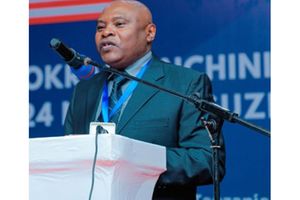Hilda narrates her journey to the world of academia

Hilda Tizeba. PHOTO | FILE
What you need to know:
- She says be it running a business or ascending the corporate ranks, it takes self-awareness for women to explore and use their potentials
Dar es Salaam. When a woman is self-aware of her vision, boundaries, career and what it takes for her to succeed in life, nothing can stop her from getting where she desires to be, says Hilda Tizeba, an assistant lecturer in law and founder of Guided Path, a mental health foundation based in Dar es Salaam.
She reveals that be it running a business or ascending the corporate ranks, it takes self-awareness for women to understand, explore and value potentials hidden in them.
Her leadership and career journey unfolded at an early age when she became the head of the debate club at Loyola High school.
From her early teens, Ms Tizeba was aware of prejudices surrounding women and it was during her time in high school when she decided to launch a campaign with a slogan ‘there is nothing domestic about domestic violence’ that focused on maximising societal engagement and awareness on domestic violence.
“Growing up, I have always been interested in intellectual discourse and argument and looking back, I can now see how all of the pieces on my life and career puzzle come together. At first, I was into international relations and was caught in the whirlwind of desiring to work for the United Nations,” she recalls.
She further details: “It was only upon the completion of my undergraduate studies in 2015, one of my professors passionately requested that I apply for a tutoring position at Udsm (the University of Dar es Salaam) that I soon found myself involved in the world of academia and it has been a blessing ever since.”
According to Ms Tizeba, during the onset of her career, she felt the pressure to constantly try to prove herself as well as assert herself for other people to take her seriously. Ms Tizeba felt that she had to put on a persona that limited her to express her individuality and authenticity.
“One of my greatest challenges has been navigating the scrutiny and negative stereotypes of what a typical lecturer in law should look like, more so a female lecturer. I have dealt with the pains of people constantly doubting my intellect and trivialising my authority as a young woman in a very conservative, male dominated profession,” she explains.
Ms Tizeba narrates that in the early days of her lecturing career, students were mistaking her for their colleagues to the extent that she developed a serious case of imposter syndrome and questioned her abilities.
However, it was due to this experience that Hilda became motivated to work even harder, read more, research more and perfect her crafts to the point she understood her element and became more confident in her profession.
“I have come to terms with rejection and the harsh reality that others may not see your vision the way you do. I have since learnt to get rid of this unnecessary pressure and I now confidently stride to the beat of my own drum. I do all of my works my way, at my pace and in a way that feels the most empowering and authentic to whom I am as an individual,” she says.
In July 2020, Ms Tizeba founded Guided Path after she witnessed some of her friends and loved ones go through mental health challenges including addiction, depression, low self-esteem and anxiety.
“I saw how they lacked assistance and places they could turn to during the times they were facing those challenges, so I decided to establish an organisation with the aim of being that ‘person’ or ‘place’ they could come and talk about the things that disturb their peace of mind,” she explains.
Guided Path conducted its first ‘Self Esteem Summer camp’ in December last year whereas it targeted on empowering and teaching teenagers about health self-esteem and the effects of social media.
According to Hilda, Gender equality in Tanzanian societies is deeply entrenched with culture, traditions and family history.
“There are many silent factors that hinder women’s rise to top leadership. It’s a potent combination of factors such as unequal distribution of labour at the family realm, cultural and social conditioning that limits women who aspire success,” she says.
She explains that since Tanzanian societies are still adjusting to women leadership, it is about time women in top positions provide tangible representation to influence the increase of women leaders to serve those particular roles.
“Tanzanian societies have to first be intentional about gender inclusion. Supportive policies that can assist women in work places should be created to make these work spaces conducive,” she suggests.
For Tanzania to rid itself of gender inequality, Ms Tizeba details that family units have a bigger role to play. She says parents and guardians are responsible for socially conditioning their daughters to aim higher in terms of careers as well as helping them understand self-love.
“This should go side by side with teaching their sons about gender sensitivity at early ages. This will instil in them multiple values such as respect and kindness towards women,” she details.
With her experience, Ms Tizeba advises women to perceive themselves as people with developmental abilities that can positively impact their societies surrounding them.
“Women have to strengthen their feminine intuitive muscle, use their Athenian-like wisdom to read and interpret other people’s emotions while bringing their conversational and relational skills to the forefront. Maximize on these feminine strengths, but at the same time, acknowledge your weaknesses, master them and mitigate them,” she advises. She also emphasises that women should seek mentorship since learning from experienced people is one of the sources of knowledge. “Women have to carefully and wisely choose people whom they allow into their life as well as practise discernment. Make sure you surround yourself with people who will mention your name in a room full of opportunities,” she says.



